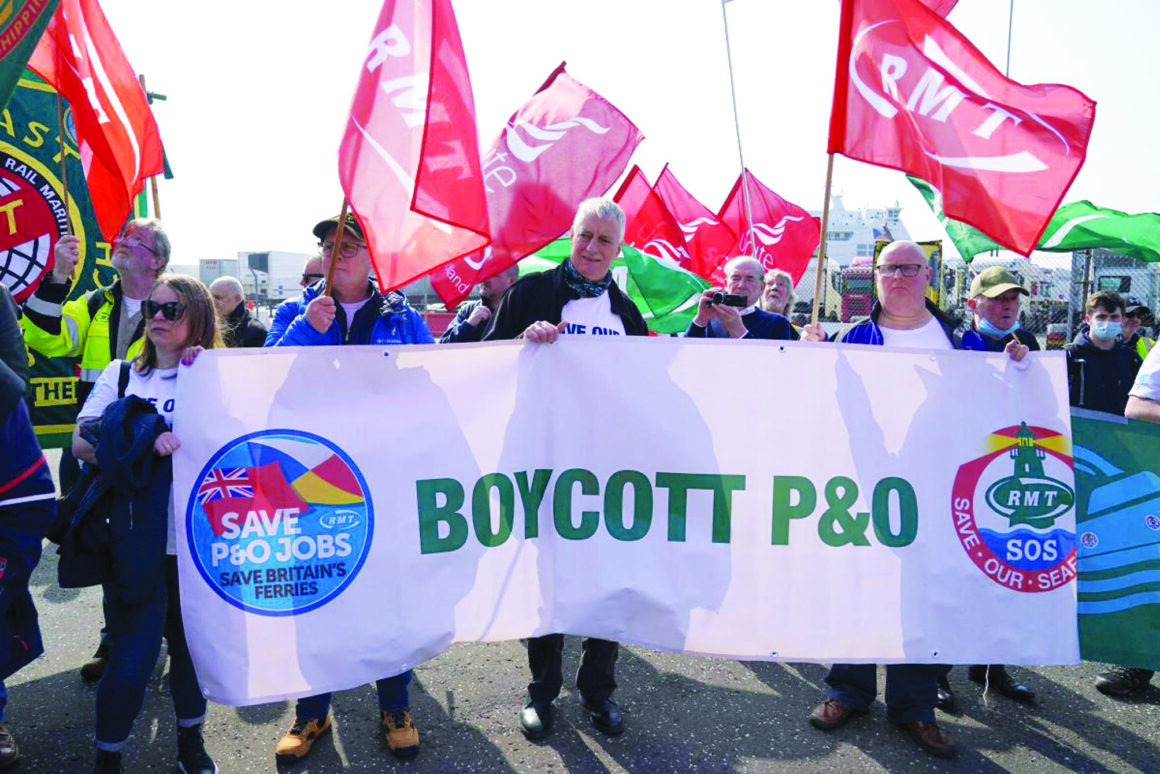By Michael O’Brien
The sacking last month, by video message, of 800 UK-based employees of P&O Ferries has unleashed a wave of anger among trade unionists and workers generally. The objective of the company is to replace its former workforce with agency staff on one-fifth of the local minimum wage.
P&O’s justification for the sackings was the losses it incurred during the pandemic. Any dip in revenues during the lockdown months was softened by £50 million it received in aid from the British government. Its parent company, DG World, made £2.9 billion profits in 2020 and was able to issue £250 million in dividends.
P&O’s hired thugs
CEO, Peter Hebbletwhaite, admitted to a parliamentary committee in Westminster that P&O consciously ignored the minimal legal obligations on employers to consult with workers and their unions in a redundancy situation. This was a cynical calculation that any penalties it suffers would be worth it from the point of view of the element of surprise it gained to cut across opposition to save the jobs. Hired security with handcuffs and scab labour sourced from crewing agents were also part of this plan for a seamless changeover of staff.
However, workers have not taken this lying down with protests and blockades taking place at the number of ports. Dockers in Rotterdam refused to load a P&O ferry being crewed by the replacement labour. A number of those engaged by the crewing agents to replace the sacked workers also quit as soon as they realised they were being hired as scabs.
The Maritime and Coastguard Agency has also prevented a ferry from sailing because it was apparent during the inspection that the crew were insufficiently trained posing a health and safety risk to themselves and passengers.
Duress
A deadline of 31 March was imposed by the company on the workers to accept an ‘enhanced’ redundancy offer with the threat that they would otherwise get the statutory minimum. It has been reported that over 500 of the 800 workers have communicated acceptance of the offer, clearly under duress.
The Tory government has done a lot of hand wringing reminiscent of the response of the government in Ireland when Irish Ferries did precisely the same thing in 2005. The idea of bilateral agreements between the UK and destination countries including Ireland to impose a ‘minimum wage corridor’ has been raised by the UK Minister for Transport, clearly under pressure from public anger.
The use of flags of convenience by employers in the maritime sector in order to circumnavigate the statutory minimum wage in port states need to be banned. The ferries affected by the sackings are flagged in Cyprus, Bermuda and the Bahamas which is the legal basis upon which the wages of the replacement labour is being set even though it is likely that none of the crew have ever or will ever set foot in any of those countries and they have to endure a northern European cost of living.
Public ownership of P&O
P&O should be nationalised, and the 800 sacked workers re-employed on their old terms and conditions. To achieve this an escalation of the struggle is needed to prevent the movement of ferries crewed by scabs. The employer took the gloves off and cast aside the legal niceties of consultation to achieve their ends. In that case the trade union movement cannot be restrained by the anti-trade union laws in standing up to these “fire and replace” tactics.
The 25 Irish employees who work the Liverpool/Dublin route are not among the sackings because the vessel on that route is flagged in the Netherlands and employment law there prevails. However, it is inconceivable that if P&O get away with the 800 sackings on the other boats that they won’t try the same in the rest of their fleet.












